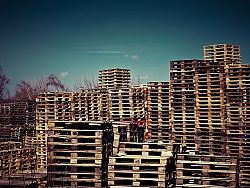

The UK Government has expressed concern over the issue of the "right sort" of wooden pallets that are used to import and export goods.
Department for the Environment, Food and Rural Affairs (DEFRA) has held meetings with the representatives of the distribution industry about how to keep goods moving to and from the supermarkets if there is a no-deal Brexit on 29 March.
If the UK leaves the EU without a deal, the majority of such pallets will not meet strict EU requirements designed to stop the spread of pests and invasive non-native species. If the pallets are prevented from transit between the UK and the Member States, the millions of tonnes of goods they carry might not be able to be transported, which could potentially lead to shortages in certain goods.
It is estimated that around three million pallets are transported between the UK and the EU every month.
The UK Government has told distributors that all timber packaging, including pallets, designed for EU countries after a no-deal Brexit must be heat-treated or fumigated to comply with International Standards For Phytosanitary (Regarding Plants) Measures 15 (ISPM15). Currently pallets transported between the UK and EU are exempted from that standard if they meet certain requirements.
According to DEFRA's statement, "In the event of a no deal, all wood packaging material moving between the UK and the EU must meet ISPM15 international standards by undergoing heat treatment and marking. All wood packaging material may be subject to official checks either upon or after entry to the EU."
According to some producers who use wood pallets for transport, currently the vast majority of wood pallets used for transport of consumer goods delivered to supermarkets in the UK are not heat treated or compliant with ISPM15.
For more information on this subject, see: